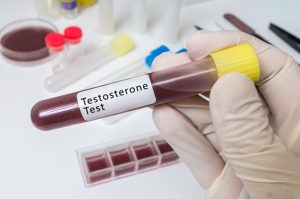 As men age, a real concern begins to pop up – that being their testosterone levels. This is because low testosterone is linked with low libido, weakness, low energy, and poor mood.
As men age, a real concern begins to pop up – that being their testosterone levels. This is because low testosterone is linked with low libido, weakness, low energy, and poor mood.
The only way to know for sure if you have low testosterone is to undergo blood work.
Advertisement
The official medical term for low testosterone is hypogonadism, and it’s treated with testosterone replacement therapy. These men may experience improvements in libido and erections, mood, strength, and energy levels.
There is another class of men that feel that because they’re lacking in their “manhood,” although they do not have hypogonadism, they require testosterone therapy. But these men won’t experience the benefits of a boost of testosterone as the men with clinically diagnosed low testosterone. In fact, researchers suggest that not only would testosterone therapy not help these men, but it could lead to adverse effects.
Around the age of 30 to 40, men begin losing testosterone at a rate of one percent annually. Normal testosterone levels are 265 to 915 nanograms per deciliter for younger men ages 19 to 39. It is not advised to recommend testosterone therapy in men who have not undergone blood work to determine testosterone levels. For men over 65 without symptoms, it is still not recommended even if testosterone levels are shown to be low.
Testosterone therapy prescriptions were on the rise until a slew of studies were released showing an increased risk of heart attack and stroke.
Advertisement
One study specifically looked at 800 men over the age of 65 who underwent testosterone therapy for at least one year, and they experienced the following results:
- All aspects of sexual function improved
- Walking distance slightly improved
- Vitality did not improve
- Cognitive function did not improve
- Mood and depressive symptoms improved slightly
- Mild to moderate anemia improved slightly
- Bone density and estimated bone strength improved
- Plaque in coronary arteries increased
- Men were more likely to have increased levels of prostate-specific antigen (PSA) – higher PSA may indicate possible prostate cancer
If you begin to experience symptoms related to low testosterone, don’t be afraid to speak to your doctor. This way, you can either determine if low testosterone is really a problem for you or if there is something else going on causing your symptoms. Furthermore, be wary of jumping to testosterone therapy.
Also read:
